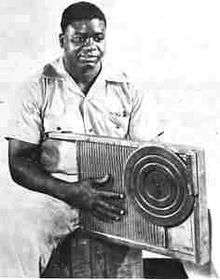Washboard Sam
| Washboard Sam | |
|---|---|
 | |
| Background information | |
| Birth name | Robert Clifford Brown |
| Born |
July 15, 1910 Walnut Ridge, Arkansas, United States |
| Died |
November 6, 1966 (aged 56) Chicago, Illinois, United States |
| Genres | Blues |
| Occupation(s) | Singer, songwriter |
| Instruments | Vocals, washboard |
| Years active | 1920s–1960s |
| Labels | Bluebird, Vocalion, RCA Victor, Folkways |
| Associated acts |
Big Bill Broonzy Memphis Slim |
Robert Clifford Brown[1] (July 15, 1910 – November 6, 1966),[2] known professionally as Washboard Sam, was an American blues musician and singer.[2]
Biography
Brown's birth details are uncertain; many sources give 1910 at Walnut Ridge, Arkansas, but researchers Bob Eagle and Eric LeBlanc suggest 1903 or 1904, at Jackson, Tennessee, on the basis of Social Security information.[1] He was reputedly the half-brother of Big Bill Broonzy.[2] He moved to Memphis, Tennessee, in the 1920s, performing as a street musician with Sleepy John Estes and Hammie Nixon.[3] He moved to Chicago in 1932, performing regularly with Broonzy and other musicians, including Memphis Slim and Tampa Red on many recording sessions for Lester Melrose of Bluebird Records.[3]
In 1935, he began recording in his own right for both Bluebird and Vocalion Records,[4] becoming one of the most popular Chicago blues performers of the late 1930s and 1940s, selling numerous records and playing to packed audiences. He recorded over 160 tracks in those decades.[5] His strong voice and songwriting talent overcame his stylistic limitations.
By the 1950s, his audience had begun to shrink, largely because he had difficulty adapting to the new electric blues.[3] His final recording session, for RCA Victor, was in 1949. He retired from music for several years, and became a Chicago police officer.[6] He recorded a session in 1953 with Broonzy and Memphis Slim. Samuel Charters included Brown's "I've Been Treated Wrong" on the compilation album The Country Blues for Folkways Records in 1959. Brown made a modest and short-lived comeback as a live performer in the early 1960s.[3]
He died of heart disease in Chicago, in November 1966,[2] and was buried in an unmarked grave at the Washington Memory Gardens Cemetery, in Homewood, Illinois.
Memorial
A concert organized by executive producer Steve Salter, of the Killer Blues organization,[7] was held on September 18, 2009, at the Howmet Playhouse Theater,[8] in Whitehall, Michigan, to raise monies for a headstone for Washboard Sam's grave. The show was a success, and a headstone was placed in October 2009. The concert was recorded by Vinyl Wall Productions and filmed for television broadcast in the mid-Michigan area by a television crew from Central Michigan University.[9] It featured musical artists such as Washboard Jo[10] and R.B. and Co. and was headlined by the Big House Blues Band.[11][12]
References
- 1 2 Eagle, Bob; LeBlanc, Eric S. (2013). Blues - A Regional Experience. Santa Barbara: Praeger Publishers. p. 241. ISBN 978-0313344237.
- 1 2 3 4 Doc Rock. "The 1960s". The Dead Rock Stars Club. Retrieved 2015-08-30.
- 1 2 3 4 "Washboard Sam / Robert Brown". Thebluestrail.com. Retrieved November 19, 2011.
- ↑ Russell, Tony (1997). The Blues: From Robert Johnson to Robert Cray. Dubai: Carlton Books. p. 13. ISBN 1-85868-255-X.
- ↑ Russell, Tony (1997). The Blues: From Robert Johnson to Robert Cray. Dubai: Carlton Books. p. 180. ISBN 1-85868-255-X.
- ↑ Pearlin, Victor (1993). Washboard Sam: Complete Recorded Works, vol. 7, 31 July 1942 to 27 October 1949. Document Records.
- ↑ "Killer Blues Headstone Project". Killerblues.net. Retrieved 2015-08-30.
- ↑ "Whitehall's Historic Howmet Playhouse". Howmetplayhouse.org. Retrieved 2015-08-30.
- ↑ "Home | Central Michigan University". Cmich.edu. Retrieved 2015-08-30.
- ↑ "Home". Washboard Jo. Retrieved 2015-08-30.
- ↑ "BHBB – Classic Blues and Blues Rock". Bighousebluesband.com. Retrieved 2015-08-30.
- ↑ Nancy Verschueren (2009-09-09). "Event will raise funds to honor deceased musician". MLive.com. Retrieved 2015-08-30.